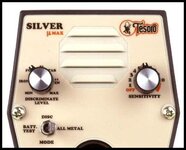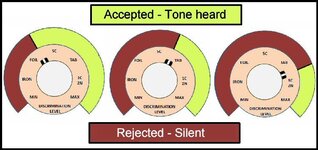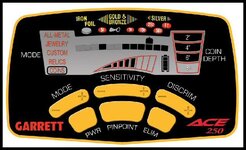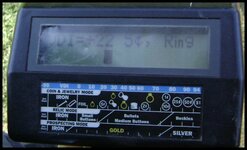stanjam
Full Member
Member Contributed Beginner's Guide
This is the place for members to contribute to the TreasureNet Beginner's Guide To Metal Detecting....
http://forum.treasurenet.com/guide
I have taken the liberty to edit Stanjam's original post. If you want to contribute to this, please respond to this thread.
Thanks,
Marc
Here is what I have so far in a FAQ. I am still new, so I am sure I am mising some stuff!
A guide for newbies:
Hi all! My name is Stan, and I am, as of this writing, very new to the Metal Detecting hobby. There is a lot to learn, and a lot to discover! In fact, all the stuff you need to know can be a bit overwhelming. This document is an attempt to share with you a lot of that information in one place for easy reference. I hope you like it!
Q: What type of metal detector is right for me?
A: There is no simple answer for this one. There are many, many, detectors available on the market. Some are better at different types of soil, and some are better at finding coins, or gold, or relics. Take some time to look at the reviews here, and research the different detectors. The best advice I can give you is don't just go out and buy a cheap, $50 detector and expect it to work well. There are quite a few reputable companies that make good entry level detectors for $150-$300. It might be worth it to start with one of these models before running out and spending $1,000-$4,000 for a top of the line detector! As a rule the entry level models are easier to learn, and this is what you need to begin. They will ALL find the stuff you want. The key is learning your particular detector! A hobbyist that knows his less expensive machine is going to do better than an inexperienced hobbyist with an expensive machine, so take the time to learn what your particular machine is telling you!
Q: How do I learn what my detector is telling me?
A: First, read the manual. It is full of great information that will aid you. Next research online for videos and tutorials. This will help you learn your machine from the people who are experienced with it! Look through the forums here, and ask if you have questions! Then air test your machine. Turn it on, and run a number of coins and objects over the coil. Listen for the sounds they make, and get to know how your detector reacts to things like coins, rings, pull tabs etc. After you have done this you can head out into the field. At first dig everything! This way you will get to know how your machine reacts to various items in the soil. Passing over items just because the machine is telling you it is a pull tab just might mean you don't find that gold ring lying right under your feet! It takes time to learn your machine, so stick with it! After ten hours or so you will know your machine, and will be able to dig more effectively for good targets. Don't get discouraged when you dig up trash. Even the most experienced hobbyists dig up their share of trash!
Q: Where should I dig?
A: There are many places to dig! The most important thing is to make sure you are allowed to dig there! Do your research. Look at old maps. Find where people used to gather, then get permission to dig there! Parks are a good place to start, though they can have a lot of trash targets as well as good stuff. If there is a caretaker, get permission to dig. Private property can also be a good place, but make sure you get permission, in writing, before you start! Federal parks are generally illegal to dig in, so don't try unless you like fines and losing your detector! Cemeteries are also a no no. One of the best places to start is your own yard. This allows you to learn your machine, and most of all, allows you to learn how to dig nice clean plugs. People will appreciate you a lot more if you don't tear up their property when you dig!
Q: How do I dig?
A: It is very important to learn how to dig properly. Learn how to pinpoint your targets. Knowing exactly where your target is in the soil means less digging. Next, learn how to dig a clean plug. One of the most accepted ways of doing this is to dig a half circle about 3-4” deep, then fold the soil back. This helps keep the grass alive by keeping the roots on one side intact. Then, after you have retrieved your target, fill your hole, and put the plug back in. The end result should look like you have never been there! It takes practice (preferably in your own yard), but the results are worth it! You will be more likely to be welcomed back to an area if you take care of the area you work! Also always take trash out with you! Don't leave the pull tab there, and pick up surface trash. Cleaning the area will also mean you are more likely to be welcomed back to an area. Leave the area in better condition than when you found it!
Q: How do I clean my finds?
A: This depends on what you find! There are many thoughts on this topic, and you can research them here. What I can tell you is that with old coins, the best advice is: DON'T. Wait until you get home to remove the dirt. Even brushing the dirt off a coin with your fingers to look at the date can scratch a coin, and make it worth a lot less! When you get home use soap and warm water to remove the loose dirt. Then you can look at the date. It won't change just because you waited until you got home to look!
Q: Where can I find more information to help me?
A: Read these forums. They are full of advice on almost any treasure hunting subject! Spend an evening going through the forums. Chances are your question has already been asked, so take your time and look through the discussions here. You will be amazed with what you learn!
Q; All I am finding is trash. Why?
A: Don't get frustrated if at first, all you find is pull tabs and foil, or bits of metal. It takes time to learn what your detector is trying to tell you. Generally speaking it takes about ten hours in the field before you know your detector well enough to know what it is trying to tell you, and it takes 100 hours or so to become real proficient with it! That is a lot of time, and a lot of digging!
Q: What tools do I need to start detecting?
A: Well, first you need a detector! There are lots of accessories you can get for every detector, and you might want to look at some of them. They make larger coils for looking deeper and covering more area. They also make smaller coils for working in trashy or hard to maneuver areas. One item you might want to invest in is a pinpointer. This is a small device that is really a mini detector. Once you dig your plug you can use the pinpointer to find where in the hole your target is. This helps speed up your search, and decreases the amount of digging and damage you have to do. Another tool you will need is a good digger. Trust me, going cheap here can hurt you! Buying a cheap trowel will leave you at best doing a lot of damage, and won't cut through roots, and at worst it will break, ending your day early. Many hobbyists use a digging tool that is serrated on one side for cutting roots, and sharp on the other for cutting plugs. It is a great investment! Other things you might want to bring with you: An apron with two pockets (one for treasure and one for trash), a flashlight, a first aid kit, gloves (so you don't cut yourself on sharp tin, glass, or needles), water, sunblock, bug spray. There are many more! Take what you need.
Q: Are there clubs I can join?
A: Absolutely! It is actually a great idea! One of the best ways to learn is to watch a pro! Many clubs are listed in these forums. Find one near you and join them for a hunt! If there isn't a club near you there might be a Tnet member near you. Ask in your state forum if there is anyone nearby who wants to join you for a hunt.
Q: Are there major treasures to be found?
A: Well, the simple answer is yes. There are stories all the time of hobbyists finding caches of coins, gold, and all sorts of stuff. What I will tell you is: If you are expecting to run out and find the mother lode, you should probably find a new hobby! Finding good treasure usually involves a lot of time detecting, and many years of research. Don't go out expecting to get rich. Go out expecting to dig up some pieces of history. You will find a lot of junk at first, but some of that junk tells stories about the past! After a while you will start to find better items, like old coins, jewelery, and relics from the past. It takes time. Learn your detector, and spend time doing research. Research pays off!
Read the forums here, research your machine and your area, learn your machine, always get permission to dig, and ALWAYS leave the area you dig in better condition than when you found it!
This is the place for members to contribute to the TreasureNet Beginner's Guide To Metal Detecting....
http://forum.treasurenet.com/guide
I have taken the liberty to edit Stanjam's original post. If you want to contribute to this, please respond to this thread.
Thanks,
Marc
Here is what I have so far in a FAQ. I am still new, so I am sure I am mising some stuff!
A guide for newbies:
Hi all! My name is Stan, and I am, as of this writing, very new to the Metal Detecting hobby. There is a lot to learn, and a lot to discover! In fact, all the stuff you need to know can be a bit overwhelming. This document is an attempt to share with you a lot of that information in one place for easy reference. I hope you like it!
Q: What type of metal detector is right for me?
A: There is no simple answer for this one. There are many, many, detectors available on the market. Some are better at different types of soil, and some are better at finding coins, or gold, or relics. Take some time to look at the reviews here, and research the different detectors. The best advice I can give you is don't just go out and buy a cheap, $50 detector and expect it to work well. There are quite a few reputable companies that make good entry level detectors for $150-$300. It might be worth it to start with one of these models before running out and spending $1,000-$4,000 for a top of the line detector! As a rule the entry level models are easier to learn, and this is what you need to begin. They will ALL find the stuff you want. The key is learning your particular detector! A hobbyist that knows his less expensive machine is going to do better than an inexperienced hobbyist with an expensive machine, so take the time to learn what your particular machine is telling you!
Q: How do I learn what my detector is telling me?
A: First, read the manual. It is full of great information that will aid you. Next research online for videos and tutorials. This will help you learn your machine from the people who are experienced with it! Look through the forums here, and ask if you have questions! Then air test your machine. Turn it on, and run a number of coins and objects over the coil. Listen for the sounds they make, and get to know how your detector reacts to things like coins, rings, pull tabs etc. After you have done this you can head out into the field. At first dig everything! This way you will get to know how your machine reacts to various items in the soil. Passing over items just because the machine is telling you it is a pull tab just might mean you don't find that gold ring lying right under your feet! It takes time to learn your machine, so stick with it! After ten hours or so you will know your machine, and will be able to dig more effectively for good targets. Don't get discouraged when you dig up trash. Even the most experienced hobbyists dig up their share of trash!
Q: Where should I dig?
A: There are many places to dig! The most important thing is to make sure you are allowed to dig there! Do your research. Look at old maps. Find where people used to gather, then get permission to dig there! Parks are a good place to start, though they can have a lot of trash targets as well as good stuff. If there is a caretaker, get permission to dig. Private property can also be a good place, but make sure you get permission, in writing, before you start! Federal parks are generally illegal to dig in, so don't try unless you like fines and losing your detector! Cemeteries are also a no no. One of the best places to start is your own yard. This allows you to learn your machine, and most of all, allows you to learn how to dig nice clean plugs. People will appreciate you a lot more if you don't tear up their property when you dig!
Q: How do I dig?
A: It is very important to learn how to dig properly. Learn how to pinpoint your targets. Knowing exactly where your target is in the soil means less digging. Next, learn how to dig a clean plug. One of the most accepted ways of doing this is to dig a half circle about 3-4” deep, then fold the soil back. This helps keep the grass alive by keeping the roots on one side intact. Then, after you have retrieved your target, fill your hole, and put the plug back in. The end result should look like you have never been there! It takes practice (preferably in your own yard), but the results are worth it! You will be more likely to be welcomed back to an area if you take care of the area you work! Also always take trash out with you! Don't leave the pull tab there, and pick up surface trash. Cleaning the area will also mean you are more likely to be welcomed back to an area. Leave the area in better condition than when you found it!
Q: How do I clean my finds?
A: This depends on what you find! There are many thoughts on this topic, and you can research them here. What I can tell you is that with old coins, the best advice is: DON'T. Wait until you get home to remove the dirt. Even brushing the dirt off a coin with your fingers to look at the date can scratch a coin, and make it worth a lot less! When you get home use soap and warm water to remove the loose dirt. Then you can look at the date. It won't change just because you waited until you got home to look!
Q: Where can I find more information to help me?
A: Read these forums. They are full of advice on almost any treasure hunting subject! Spend an evening going through the forums. Chances are your question has already been asked, so take your time and look through the discussions here. You will be amazed with what you learn!
Q; All I am finding is trash. Why?
A: Don't get frustrated if at first, all you find is pull tabs and foil, or bits of metal. It takes time to learn what your detector is trying to tell you. Generally speaking it takes about ten hours in the field before you know your detector well enough to know what it is trying to tell you, and it takes 100 hours or so to become real proficient with it! That is a lot of time, and a lot of digging!
Q: What tools do I need to start detecting?
A: Well, first you need a detector! There are lots of accessories you can get for every detector, and you might want to look at some of them. They make larger coils for looking deeper and covering more area. They also make smaller coils for working in trashy or hard to maneuver areas. One item you might want to invest in is a pinpointer. This is a small device that is really a mini detector. Once you dig your plug you can use the pinpointer to find where in the hole your target is. This helps speed up your search, and decreases the amount of digging and damage you have to do. Another tool you will need is a good digger. Trust me, going cheap here can hurt you! Buying a cheap trowel will leave you at best doing a lot of damage, and won't cut through roots, and at worst it will break, ending your day early. Many hobbyists use a digging tool that is serrated on one side for cutting roots, and sharp on the other for cutting plugs. It is a great investment! Other things you might want to bring with you: An apron with two pockets (one for treasure and one for trash), a flashlight, a first aid kit, gloves (so you don't cut yourself on sharp tin, glass, or needles), water, sunblock, bug spray. There are many more! Take what you need.
Q: Are there clubs I can join?
A: Absolutely! It is actually a great idea! One of the best ways to learn is to watch a pro! Many clubs are listed in these forums. Find one near you and join them for a hunt! If there isn't a club near you there might be a Tnet member near you. Ask in your state forum if there is anyone nearby who wants to join you for a hunt.
Q: Are there major treasures to be found?
A: Well, the simple answer is yes. There are stories all the time of hobbyists finding caches of coins, gold, and all sorts of stuff. What I will tell you is: If you are expecting to run out and find the mother lode, you should probably find a new hobby! Finding good treasure usually involves a lot of time detecting, and many years of research. Don't go out expecting to get rich. Go out expecting to dig up some pieces of history. You will find a lot of junk at first, but some of that junk tells stories about the past! After a while you will start to find better items, like old coins, jewelery, and relics from the past. It takes time. Learn your detector, and spend time doing research. Research pays off!
Read the forums here, research your machine and your area, learn your machine, always get permission to dig, and ALWAYS leave the area you dig in better condition than when you found it!



 THANKS STANJAM!
THANKS STANJAM!





